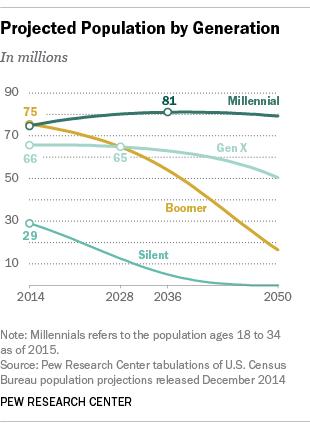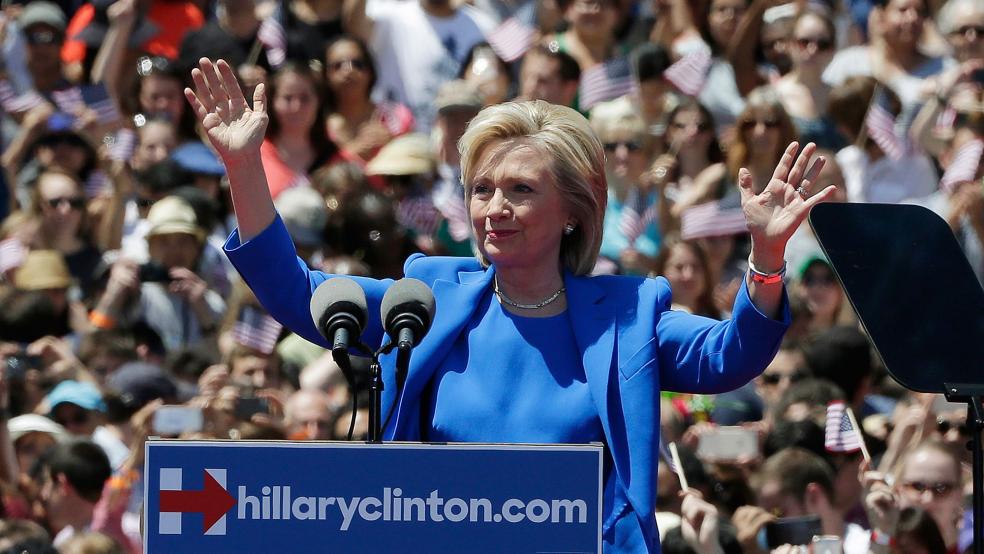Is there a saboteur in Hillary’s camp? Given the serial missteps in her campaign (the limp announcement video and lassoing reporters spring to mind), one wonders. The latest blooper snuck into Mrs. Clinton’s economic policy speech – a mish-mash of platitudes geared to pleasing various core constituencies. She gave a nod to working mothers, small business owners, minimum-wage workers, unions and other voter blocks. But, she goofed big time when she skittered off-cliché and attacked “the so-called gig economy.” It was a glancing blow, to be sure, but damaging nonetheless.
Here’s why: Hillary Clinton absolutely needs the millennial vote. And millennials, the largest generation in U.S. history, are absolutely besotted with the “shared” economy. Mess with Uber, or Airbnb, and you’ll find yourself on the wrong end of a selfie stick, or worse.
Related: Do You Trust Her? For Clinton, More People Say No
In her speech, the former First Lady acknowledged, “Many Americans are making extra money renting out a small room, designing websites, selling products they design themselves at home, or even driving their own car.” She describes the “on-demand” economy as “creating exciting economies and unleashing innovation.” She then cautions that such activities “are raising hard questions about work-place protections and what a good job will look like in the future.”
In other words, these jobs are under-regulated and worse -- it is unlikely these jobs will be unionized, and in fact they may further undermine unionization. What’s a Democrat to do? Check the math: there are some 75.3 million voting age millennials (age 18 to 34) and only about 14 million union members. Easy choice.
Moreover, while the union vote is firmly blue, the millennial vote is up for grabs. Of the various groups that coalesced to elect President Obama, this one is perhaps the most skittish, and the most necessary for Mrs. Clinton. A study from Tufts University indicates that Obama captured 67 percent of the youth vote in 2012, compared to 30 percent for Mitt Romney. Moreover, Obama took 61 percent of the youth vote in four critical states: Florida, Virginia, Pennsylvania and Ohio. As reported by Politico, “If Romney had achieved a 50-50 split, he could have flipped those states to his column.”
Some 22 to 23 million people between the ages of 18 and 29 voted in the 2012 election, accounting for about 19 percent of the electorate. About half those eligible turned out – roughly the same as in 2008 and 2004. That’s an uptick from the 1990s, when turnout from Generation X was routinely below 40 percent. Electing the first black president – and a young, hip one at that – excited young voters. Can Hillary Clinton do that too?
Related: Hillary Clinton Pledges Bigger Rewards for Corporate Whistleblowers
Maybe, but it won’t be easy, especially if she attacks their worldview. Millennials’ affection for President Obama, and for Democrats, wavered last fall, according to a poll conducted by Harvard’s Institute of Politics. The president’s approval rating had tumbled, and especially on economic policy and on Obamacare. Millennials don’t much like Obamacare; they know that as healthy youngsters they are being asked to shoulder the cost of providing free medical care to older, sicker Americans.
The Harvard poll showed millennials disenchanted with government dysfunction and unlikely to attach to either party. The souring might stem from disappointment; young voters believed President Obama’s promises to bring the country together, reform immigration and create green jobs – promises that were broken. IOP survey director John Della Volpe was quoted at the time saying, "Young people are returning back to pre-Obama roots of being a swing-vote constituency."
In last November’s election, the youth vote plummeted to 13 percent of the total (some decline would be expected in a non-presidential election) and Democrat’s share of millennials’ vote fell to 54 percent, compared to 43 percent for the GOP.
Hillary has to woo this group. For sure, she has a head start. The most recent Harvard poll conducted early this spring showed that 55 percent of millennials would prefer to see a Democrat elected in 2016, compared to 40 percent who favor a GOP victory. Still, that survey preceded the roll out of most GOP campaigns as well as damaging revelations about the Clinton Foundation and how Hillary Clinton handled her emails.
Related: Clinton Talks Pantsuits, Ignores Syria in Facebook Q and A
To keep young voters in her column, Hillary Clinton needs to understand that this is an impatient generation that spurns corporate hierarchy, likes its freedom and worships entrepreneurship. Their idols are Mark Zuckerberg and Steve Jobs, and they are not into working nine to five. According to one report, “Turnover figures for millennials are already twice as high as for other generations, with millennials rarely staying on the job for more than three years. Millennials are also more likely to work for themselves.”
The Internet has fueled this opportunity. Check out the latest “Thirty Under Thirty” from Forbes, and you’ll find dozens of successful young people launching apps that “turn your smartphone into life’s remote control”, as the magazine puts it. Apps that speed food delivery, enable simpler photo sharing, time management – all kinds of innovations. It’s not just about apps; many other start-ups involve popular blogs, online retailing, and on and on.
Such endeavors are enormously positive for the U.S., where entrepreneurship has been on the decline. They provide jobs for people who want part-time work, who are busy working on the next start-up. Uber alone has created 300,000 jobs around the world. Take TaskRabbit – an online provider of help for those too busy to run errands or assemble their IKEA furniture, available now in 19 cities. The service employs and vets the “rabbits” through background checks and in-person interviews. In many ways, it is the archetypal twenty-first century start-up. As Bloomberg Business Week wrote, “TaskRabbit is betting on a future where employment will seem much more like a series of small-scale agreements between businesses and labor than jobs in the traditional sense.”
Related: Clinton—I Don’t Trust the Iranians
Such businesses can be disruptive. When Uber clashes with entrenched taxi interests, it faces a political headwind. Airbnb upsets hotel owners and, as important, unionized hotel workers. That’s what alarms Hillary Clinton. That -- and a tendency for these upstart operations to elude regulation. She is going to have to make a choice: back the economy of the future, or double down on propping up the politics and policies of the past. Only one path will take her to the White House.






